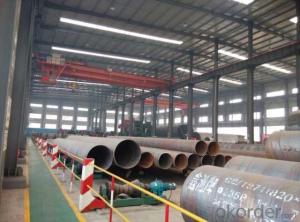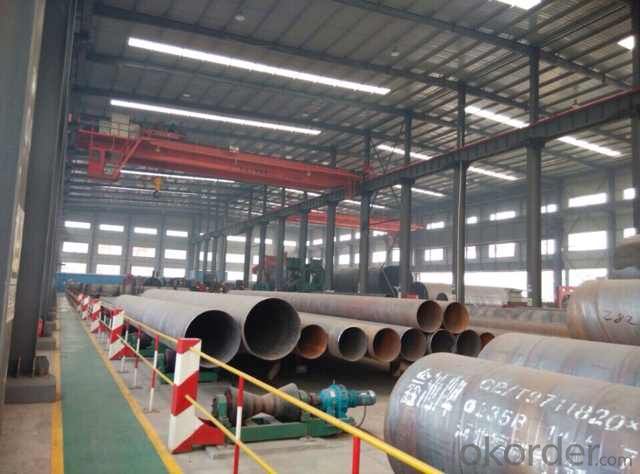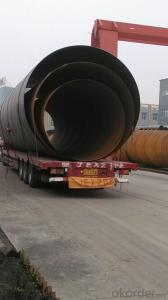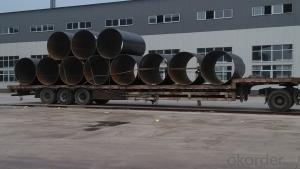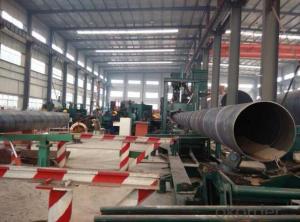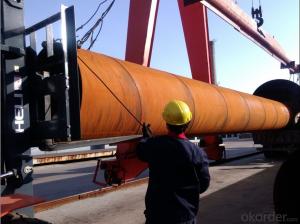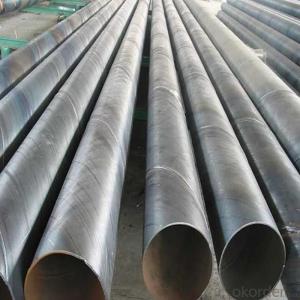SSAW STEEL PIPE 219-3920MM API/ISO/ASTM/JIS CARBON
- Loading Port:
- China Main Port
- Payment Terms:
- TT OR LC
- Min Order Qty:
- -
- Supply Capability:
- -
OKorder Service Pledge
OKorder Financial Service
You Might Also Like
Packaging & Delivery
Packaging Detail: | standard export packing or as customer's requirement |
Delivery Detail: | within 10 - 30 days |
Specifications
Spiral Welded Steel Pipes and Tubes
1.Material:Q195-Q235
2.Length:1-12m
3.WT:1.0-14mm
4.O.D.:219-3920mm
Product Description:
1.Material : Q235,Q345,L245,L290,L360,L415,L450,L485,GrB,X42,46,X52,X56,X60,X65,X70,X80,X100
2,Standard: SY/T5037-2000,GB/T9711-2011,API Spec 5L PSL1/PSL2,ASTM A252\A53,ISO3183,DIN17172,EN10217,JIS G3457,AWWA C200,ASTM A139,ASTM A671,ASTM A672
3.Wall thickness: 3.0mm-30mm
4.Outer diameter: φ219mm-3920mm
5,Length: 5m-12m or as customer requirement
6,Corrosion protection standard: DIN30670,DIN30671, AWWAC210, AWWA C203, SY/T0413-2002,SY/T0414-2002
7,Application: Oil, gas, natural gas, water pipe, thermal electricity pipe, steel structure engineering, etc
Q195-Q345 Material Steel Pipe's Materials
Elements | Chemical Compsition% | Mechanical Property | ||||||
| C% | Mn% | S% | P% | Si% | Yield Point (Mpa) | Tensile Strength(Mpa) | Elongation |
Q195 | 0.06-0.12 | 0.25-0.50 | <0.050 | <0.045 | <0.030 | >195 | 315-430 | 32-33 |
Q215 | 0.09-0.15 | 0.25-0.55 | <0.05 | <0.045 | <0.030 | >215 | 335-450 | 26-31 |
Q235 | 0.12-0.20 | 0.30-0.70 | <0.045 | <0.045 | <0.030 | >235 | 375-500 | 24-26 |
Q345 | <0.20 | 1.0-1.6 | <0.040 | <0.040 | <0.55 | >345 | 470-630 | 21-22 |
- Q: How to calculate the maximum bending stress of steel pipe? Is there a list of the maximum flexural normal stresses for steel pipes of different materials and diameters?
- The maximum flexural normal stress is calculated as: Sigma =M/ (gamma x*Wnx).Of which: M is the maximum bending moment of the steel tube;Gamma X - the plastic development coefficient of the cross section; for the cross section of the steel tube, 1.15,
- Q: How are steel pipes used in the manufacturing of chemical storage tanks?
- Steel pipes are used in the manufacturing of chemical storage tanks for their durability, strength, and resistance to corrosion. These pipes are utilized for the construction of the tank's framework, as well as for the transport of chemicals within the tank. The steel pipes provide a reliable and secure infrastructure, ensuring the safety and integrity of the chemicals stored inside the tank.
- Q: Can steel pipes be used for structural supports in buildings?
- Yes, steel pipes can be used for structural supports in buildings. Steel pipes are known for their strength, durability, and ability to withstand heavy loads. They have high tensile strength, which means they can withstand large amounts of tension and compression without breaking or deforming. This makes them ideal for structural applications in buildings where strong and stable supports are required. Steel pipes can be used for various purposes such as columns, beams, trusses, and even as the main support for the entire building. They are also versatile and can be easily fabricated and customized to fit specific design requirements. Additionally, steel pipes are resistant to fire, corrosion, and pests, making them a reliable choice for long-term structural support in buildings.
- Q: How are steel pipes used in the manufacturing of railways?
- Steel pipes are used in various ways in the manufacturing of railways. One of the primary uses of steel pipes in this context is for the construction of the railway track itself. Steel pipes are used to create the rail tracks that form the foundation of the railways. These pipes are typically welded together to form long, sturdy tracks that can withstand the weight and pressure of trains passing over them. Steel pipes are also used in the manufacturing of railway bridges and tunnels. These structures require strong and durable materials to ensure the safety and stability of the railway system. Steel pipes are often used in the construction of the support structures or piers that hold up the bridges. They are also used in the creation of tunnels, providing structural support and stability. Additionally, steel pipes are used in the manufacturing of various railway components and equipment. For example, steel pipes are used in the fabrication of railway signaling systems, which are responsible for controlling the movement of trains and ensuring safety. These pipes are often used to house and protect the electrical wiring and other components of the signaling systems. Furthermore, steel pipes are used in the manufacturing of railway carriages and locomotives. These pipes are used to create the framework and structure of the train, providing strength and stability. They are also used for various other purposes, such as the creation of air conditioning systems, brake systems, and fuel delivery systems within the train. Overall, steel pipes play a crucial role in the manufacturing of railways. They are used for the construction of rail tracks, bridges, tunnels, and various railway components and equipment. The strength and durability of steel make it an ideal material for ensuring the safety and efficiency of railway systems.
- Q: What is the difference between hot-dip galvanizing and electroplating for steel pipes?
- Hot-dip galvanizing and electroplating are both methods used to protect steel pipes from corrosion, but they differ in the process and the properties of the resulting coating. Hot-dip galvanizing involves immersing the steel pipe in a bath of molten zinc, which forms a thick and durable coating that bonds metallurgically with the steel. This provides excellent corrosion resistance and protection even in harsh environments. On the other hand, electroplating involves the deposition of a thin layer of zinc onto the steel pipe using an electric current. While electroplating also offers corrosion protection, the coating is typically thinner and less durable than hot-dip galvanizing. Hot-dip galvanizing is typically preferred for steel pipes that require long-lasting protection, while electroplating may be suitable for applications where a thinner coating is sufficient.
- Q: How do steel pipes resist corrosion?
- Steel pipes resist corrosion through various methods, primarily due to the protective properties of the material itself. Firstly, steel contains a small amount of carbon, which creates a thin, invisible layer on the surface of the pipe known as a passive film. This film acts as a barrier, preventing oxygen and moisture from reaching the underlying steel and thus inhibiting corrosion. Additionally, steel pipes are often coated with protective materials such as zinc, epoxy, or polyethylene, which provide an additional layer of defense against corrosion. Regular maintenance and inspections also play a crucial role in preventing corrosion by identifying and addressing any potential vulnerabilities in the pipes.
- Q: How are steel pipes used in the manufacturing of machinery?
- Steel pipes are commonly used in the manufacturing of machinery for various purposes such as conveying fluids, gases, or solids, and providing structural support. They are used to transport materials within the machinery, including coolant, lubricants, and gases. Steel pipes also play a crucial role in creating the framework or structure of machinery, providing stability and strength. Additionally, they are used for creating pneumatic systems, hydraulic systems, and exhaust systems in machinery.
- Q: What is PE coated steel pipe? Seek explanation
- PE pipe is a kind of thermoplastic resin with high crystallinity and non polarity.
- Q: What are the different international standards for steel pipes?
- There are several international standards for steel pipes that are widely recognized and used in the industry. Some of the key standards include: 1. ASTM A53: This standard covers seamless and welded black and hot-dipped galvanized steel pipes. It is commonly used for low-pressure applications such as water, gas, and steam. 2. ASTM A106: This standard covers seamless carbon steel pipes for high-temperature service. It is widely used in refineries, power plants, and petrochemical industries where high pressure and temperature conditions exist. 3. ASTM A312: This standard covers seamless, welded, and heavily cold worked austenitic stainless steel pipes. It is often used for high-temperature and corrosive environments in industries such as chemical processing, food processing, and pharmaceuticals. 4. API 5L: This standard specifies requirements for the manufacture of two product specification levels (PSL1 and PSL2) of seamless and welded steel pipes for use in pipeline transportation systems in the petroleum and natural gas industries. 5. EN 10216: This European standard covers seamless steel pipes for pressure purposes. It is used in various industries such as power generation, chemical, and oil and gas. 6. JIS G3454: This Japanese standard covers carbon steel pipes for pressure service. It is commonly used in the transportation of water, gas, and oil. 7. DIN 2448: This German standard specifies seamless steel pipes for general purposes. It is widely used in various industrial applications. These are just a few examples of the many international standards that exist for steel pipes. Each standard specifies different requirements for manufacturing, dimensions, mechanical properties, and testing to ensure the quality and performance of the pipes in specific applications. It is important for manufacturers, suppliers, and users to understand and comply with the relevant standards to ensure the safe and reliable use of steel pipes.
- Q: Where is the difference between seamless steel pipe and welded pipe?
- Seamless steel tube is formed during rolling. Welded steel pipes need to be welded after coiling, and spiral welding and direct welding are generally used. Seamless performance is better, of course, the price is higher.
Send your message to us
SSAW STEEL PIPE 219-3920MM API/ISO/ASTM/JIS CARBON
- Loading Port:
- China Main Port
- Payment Terms:
- TT OR LC
- Min Order Qty:
- -
- Supply Capability:
- -
OKorder Service Pledge
OKorder Financial Service
Similar products
Hot products
Hot Searches
Related keywords
